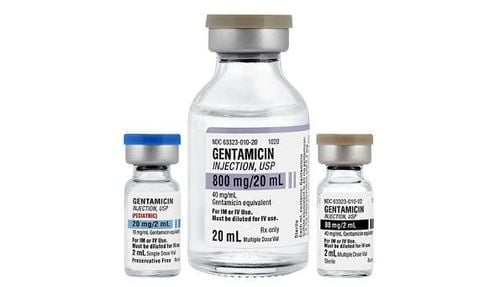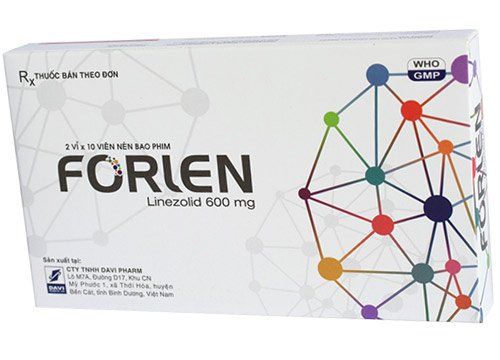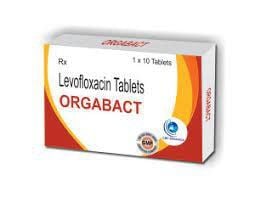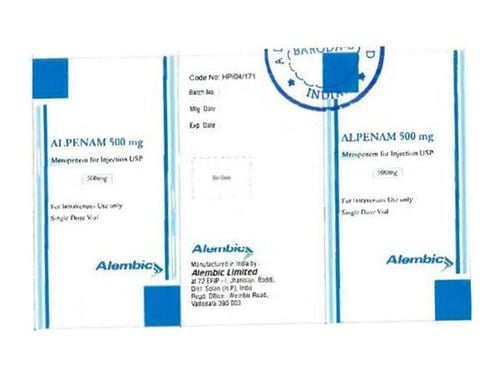This is an automatically translated article.
Amphalizol drug is known for its use in the treatment of diseases such as hospital-acquired pneumonia and community-acquired pneumonia. In this article, patients can refer to some information about the use, dosage and use of the drug to achieve the highest efficiency.
1. What are the effects of Amphalizol?
Amphalizol 400 or Amphalizol 600 is a medicine containing the active ingredient Linezolid with a strength of 400mg or 600mg. This is an antibiotic that works by stopping the growth of bacteria.
According to research literature, Linezolid is a synthetic antibiotic with in vitro activity against aerobic and anaerobic Gram-positive bacteria, treating only bacterial infections and not being effective in viral infections. (such as the common cold, flu).
2. Indications and contraindications for Amphalizol
2.1. Indications for use of Amphalizol With the above effect, Amphalizol drug is indicated for use in the following cases:
Patients with infections caused by Enterococcus faecum that are resistant to Vancomycin, including cases of sepsis. People with hospital-acquired pneumonia caused by Staphylococcus aureus (Amphalizol works against both Methicillin-sensitive and resistant strains). Patients with complicated skin infections caused by Staphylococcus aureus (including Methicillin-susceptible and resistant strains), Streptococcus pyogenes, Streptococcus agalactiae. People with uncomplicated skin infections caused by Staphylococcus aureus (including Methicillin-resistant and susceptible strains), Streptococcus pyogenes. People with community infection caused by Streptococcus pneumoniae (Amphalizol is only effective against penicillin-sensitive strains), including those with active bacteremia or Staphylococcus aureus (effective only against Methicillin-susceptible strains). 2.2. Amphalizol is contraindicated in the following cases:
People with a history of hypersensitivity or at risk of allergy to any component of Amphalizol. The patient is taking or has ever taken a drug that inhibits Monoamine Oxidase A or B (eg, Phenelzine, Isocarboxazid, Selegiline,...) in the previous 2 weeks. Amphalizol should not be used for people who are using drugs to treat uncontrolled hypertension, bipolar depression, schizophrenia,... Amphalizol should not be used in patients who are taking Serotonin reuptake inhibitors. , tricyclic antidepressants, Dopaminergic drugs, Serotonin 5-HT1 agonists, Pethidine or Buspirone, direct and indirect sympathomimetic agents,... Amphalizol is contraindicated in pregnant women and breastfeeding mothers.
3. Dosage and how to use Amphalizol
Amphalizol is taken orally at the dose prescribed by the treating doctor. However, the usual recommended dose is as follows:
Patients with infections caused by Enterococcus faecum that are resistant to Vancomycin: Use Amphalizol at a dose of 600 mg x 2 times / day x 14 - 28 days. Patients with hospital-acquired pneumonia, complicated skin infections, community-acquired pneumonia: Use Amphalizol at a dose of 600mg x 2 times/day x 10-14 days. Patients with uncomplicated skin infections: Use the drug at a dose of 400mg x 2 times/day x 10-14 days. No dose adjustment of Amphalizol is required in patients with renal impairment.
4. Amphalizol side effects
Some unwanted effects users may experience when using Amphalizol are diarrhea, headache, nausea and vomiting. In addition, patients may also experience some other rare adverse reactions such as localized abdominal pain, transient ischemic attack and hypertension. In particular, some studies in laboratory animals show that use of Amphalizol can reduce fertility. Basically, the patient should immediately notify the treating doctor if after using the drug there are abnormal symptoms for advice on timely measures.
5. Drug interactions
Patients should not use Amphalizol together with some antidepressants such as Mirtazapine Paroxetin, Selegiline, ... due to the risk of Serotonin syndrome. At this time, some common manifestations include high fever, hyperreflexia, muscle twitching,.... Avoid using together with Savipharm, Pseudoephedrine or Phenylpropanolamine because it can easily lead to increased systolic blood pressure. If you take foods with high Tyrosine content while taking Amphalizol, it can cause an increase in blood pressure. Therefore, you need to pay attention to each meal should only consume less than 100mg of Tyrosine.
6. Precautions while using Amphalizol
If you are allergic to Amphalizol, other similar drugs or any of its ingredients, consult your doctor before taking. Be careful when using this medicine for people who have or have ever had chronic (long-term) infections, high blood pressure, hyperthyroidism, immunosuppression (problems related to the immune system), Pheochromocytoma (appears a mass). pheochromocytoma), seizures, or kidney disease. Use caution if you have surgery, including dental surgery, and tell your doctor or dentist that you are taking Amphalizol. Use the correct dose and time of use, absolutely do not arbitrarily change the dose of Amphalizol. Above is some information about Amphalizol drug that patients can refer to. Note, Amphalizol is a prescription drug, patients need to use the drug as prescribed by the doctor, absolutely do not self-treat at home to avoid unintended side effects.













